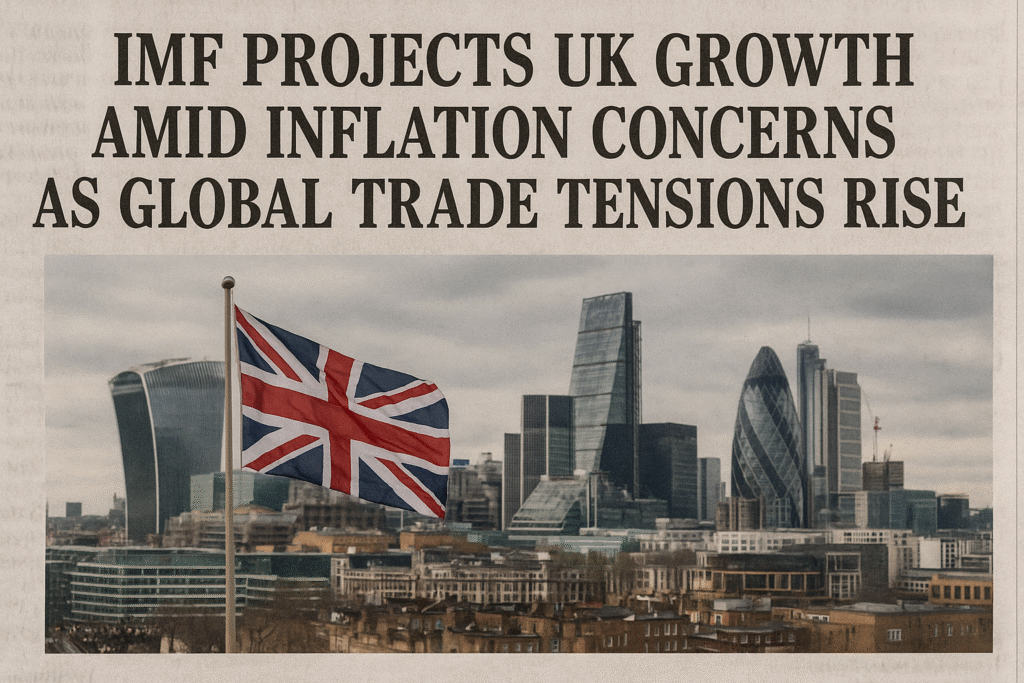By Harshit, WASHINGTON — October 15, 2025
The United Kingdom is set to be one of the fastest-growing economies among advanced nations this year, according to new projections from the International Monetary Fund (IMF), but faces the highest inflation rate among G7 countries due to rising energy and utility costs.
The IMF’s twice-yearly outlook notes that while the UK economy is showing resilience amid geopolitical tensions and global trade shocks, growth remains modest.
UK Growth Outlook
The IMF forecasts the UK will achieve 1.3% GDP growth in 2025, placing it behind only the United States among G7 nations. Growth per capita is expected to remain low at 0.4% this year and 0.5% in 2026, ranking the UK at the bottom of the G7 in per-head terms.
Chancellor Rachel Reeves, attending the IMF gathering in Washington, acknowledged the sense of stagnation felt by citizens. “Working people feel it every day, experts talk about it, and I am going to deal with it,” she said, emphasizing her efforts to reassure investors about the UK’s financial stability.
Inflation Pressures Persist
Despite the growth outlook, the IMF highlighted that inflation in the UK is expected to remain above peer nations, with consumer prices forecast to rise by 3.4% in 2025 and 2.5% in 2026. The Fund anticipates this higher inflation will be temporary, falling to 2% by the end of next year.
Bank of England Governor Andrew Bailey echoed these sentiments, noting that inflationary pressures appear to be easing as unemployment rises and wage growth slows.
Shadow Chancellor Sir Mel Stride criticized the outlook, saying UK households are “being squeezed from all sides,” citing high living costs, rising debt, and low business confidence.
Global Trade and U.S. Tariffs
IMF forecasts are heavily influenced by U.S.-imposed tariffs, a weakened dollar, and questions over Federal Reserve independence. The Fund warned that while the tariff shock is impacting global investment and consumption, the effect has been less severe than initially feared due to mitigating factors in international trade and policy responses.
Pierre-Olivier Gourinchas, IMF Chief Economist, highlighted that trade policy uncertainty is weighing on global economic activity but noted the negative consequences have been tempered by offsets and adaptations by businesses.
The IMF cited Canada as a nation particularly affected by trade disputes, with growth slowed this year but expected to rebound in 2026, while Germany, France, and Italy are projected to grow more slowly at 0.2%–0.9% over the two years.
AI Investment and Market Risks
The IMF also expressed caution about the overvaluation of AI-focused tech stocks. In its Global Financial Stability Report, the Fund noted markets appear “complacent” and that the concentration of tech stock valuations is even higher than during the dotcom bubble of 2000.
While not predicting an imminent market correction, Mr. Gourinchas warned that excessively optimistic AI expectations represent a risk. He also acknowledged that the AI investment boom is supporting U.S. economic growth and contributing to global market optimism.
Summary
- UK GDP growth forecast: 1.3% in 2025, per-capita growth: 0.4%
- UK inflation forecast: 3.4% in 2025, 2.5% in 2026
- IMF flags global trade uncertainty from U.S. tariffs
- AI investment boom: driving growth but creating market overvaluation risks
The IMF’s outlook underscores a UK economy that is resilient but facing persistent cost pressures, amid a complex global backdrop of trade tensions, inflationary pressures, and tech-driven market optimism.

